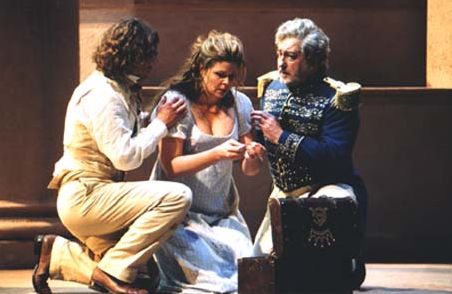|
|
|
|
|
|
|
|
| Culturekiosque.com |
| By Joel Kasow |
Thomas, Mignon, April 2001
|
Opera in the Provinces is not Always Provincial
|
|
 PARIS, 8 June 2001 - After suffering through a
great many misconceived productions this year at the Opéra National de
Paris, it is a pleasure to report that opera is alive and well in France
outside the capital. It has been possible to encounter such rarities as
L'Atlantide by Henri Tomasi, Marouf by Henri Rabaud and Bérénice by Alberic
Magnard at the Opéra de Marseilles, Hérodiade by Jules Massenet at St.
Etienne and Avignon, Ippolito ed Aricia by Tommaso Traetta at Montpellier,
Vanessa by Samuel Barber at Metz and Monte Carlo (which is not France),
Mignon by Ambroise Thomas at Toulouse, Der Prozess by Gottfried von Einem at
Nantes. I saw most of these productions and came away with largely positive
impressions, not only for the enterprise shown but also for the quality of
the execution. PARIS, 8 June 2001 - After suffering through a
great many misconceived productions this year at the Opéra National de
Paris, it is a pleasure to report that opera is alive and well in France
outside the capital. It has been possible to encounter such rarities as
L'Atlantide by Henri Tomasi, Marouf by Henri Rabaud and Bérénice by Alberic
Magnard at the Opéra de Marseilles, Hérodiade by Jules Massenet at St.
Etienne and Avignon, Ippolito ed Aricia by Tommaso Traetta at Montpellier,
Vanessa by Samuel Barber at Metz and Monte Carlo (which is not France),
Mignon by Ambroise Thomas at Toulouse, Der Prozess by Gottfried von Einem at
Nantes. I saw most of these productions and came away with largely positive
impressions, not only for the enterprise shown but also for the quality of
the execution.
Mignon appears from time to time in various opera houses, the last time in
France about three or four years ago. The Théatre du Capitole in Toulouse
pulled out all the stops, with Susan Graham in the title role and Annick
Massis as Philine. A promising tenor, Jonas Kaufmann, took the role of
Wilhelm Meister. Ms. Graham missed the opening night because of illness, but
when I attended (the third performance) she was in glorious form and we can
only hope that she can impose the work in a few of the other opera houses
where she appears regularly. Kaufmann was unfortunately not at his best, but
even despite what must have been a considerable cold his intentions mark him
as a singer to watch, while some of the ringing high notes showed his
capacities. Annick Massis made light of the difficulties of her role,
while Alain Vernhes gave us a sympathetic Lothario despite a voice that is
beginning to fray. Isabelle Cals sang Frédéric and looks like she would be
an excellent Cherubino as well.
Jonas Kaufmann, Susan Graham and Alain Vernhes in Mignon
Nicolas Joel, Director / Photo: Patrick Riou
Nicolas Joel's production opted for simplicity, while the traditional sets
and costumes of, respectively, Emilio Carcano and Gérard Audier were balm to
the eyes after the aberrations that have become the rule these days.
Emmanuel Villaume effectively replaced the originally scheduled Michel
Plasson but he has yet to master the art of rubato, here far too obvious,
calling attention to itself. In addition, the work was given complete in the
version with recitatives, a good three hours of music, a respect that was
certainly lacking when the work was revived at Compiègne and for some
inexplicable reason recorded with an inadequate cast (except Mme. Massis). |
|
|
|
|
|
|
|
|
|
|
|
|
|
|
|
|
|
|